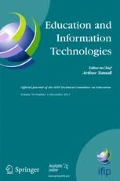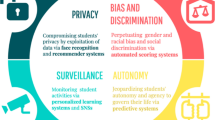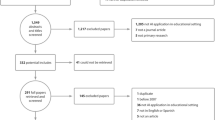Abstract
This purpose of this paper is to argue the case for investigating the culture of information in primary schools. Recent technological change has altered the relationship between the individual and information, yet this change appears not to be reflected in the culture of schools, especially primary schools. To this end the area of the primary ICT curriculum which is categorised as “information handling” is examined, to investigate the current likely manifestation of this culture in schools. Using Hatano’s concept of Adaptive Expertise as its theoretical perspective, the curriculum is analysed from the point of view of how well it is likely to prepare children for a life in which the ability to evaluate information will become a generically crucial skill needing to be applied in many varied and unforeseeable circumstances. Educational researchers have argued the case for change in the way we teach children to deal with information in schools; however this paper suggests that the existing culture of schools needs to be understood and opportunities for change identified if these skills are successfully to be introduced.

Similar content being viewed by others
Notes
QCA quoted by BECTA published on Becta website dated 2004 updated 2007; http://schools.becta.org.uk/index.php?section=cu&catcode=ss_cu_skl_02&rid=1701
For example, History, there is plenty of material for teaching about the Victorian period which ended in 1902, and for the Unit called “Britain since 1930”. Yet there is little commercial material covering the period between 1902 and 1930, so children do not learn about the First World War, the Suffragettes and the Russian revolution
Prospectus from a 5–11 primary school in the London Borough of Ealing 2003
References
Baudrillard, J. (1998). Simulacra and simulations. In Poster, M (Ed) Jean Baudrillard, Selected Writings. Stanford University Press pp 166–184.
Beard, R. (1969). An outline of piaget’s developmental psychology. London: Routledge & Kegan Paul.
BECTA (2009) BECTA’S Contribution to the Rose Review. BECTA. Coventry.
Berners-Lee, T. (2001). The Semantic Web. Scientific American. May 2001.
Bentley, T., & Selzer, K. (1999). The creative age: knowledge and skills for the new economy. London: Demos.
Bilal, D. (2000). Children’s use of Yahoologans! Web search engine: 1. Cognitive, physical and affective behaviors on fact-based search tasks. Journal of the American Society for Information Science, 51(Part 7), 646–665.
Brown, J. S., & Duguid, P. (2000). The social life of information. Cambridge Mass: Harvard Business School Press.
Byron, T. (2008). Safer children in a digital world. DCSF Publications. London http://www.dcsf.gov.uk/byronreview/pdfs/Final%20Report%20Bookmarked.pdf. Accessed 10 January 2009.
DCSF (2009) Independent review of the primary curriculum. London: DCSF.
EPPI (2002). A Systematic Review of the Impact of Summative Assessment and Tests on Students’ Motivation for Learning. http://eppi.ioe.ac.uk/cms/Default.aspx?tabid=108. Accessed 10 January 2009.
Hatano, G., & Inagaki, K. (1986). Two courses of expertise. In H. Stevenson & K. Hakuta (Eds.), Child development and education in Japan. New York: Freeman.
Hirsh, S. (2000). Children’s relevance criteria and information seeking on electronic resources. Journal of the American Society for Information Science., 50(14), 1265–1283.
Katayama, Y. (2008). “Chiteki rikkoku to shite no toshokan to sono kanousei”. Language, 37(9), 28–33. Translation; “Libraries support lifelong learning”.
Lin, X., Schwartz, D., & Bransford, J. (2007). Intercultural adaptive expertise; explicit and implicit lessons from Dr Hatano. Human Development, 50(1).
Livingstone, S., & Bober, M. (2005). Children go online: final report of key project findings. LSE Research Online. London http://eprints.lse.ac.uk/399/1/UKCGO_Final_report.pdf Accessed 10 January 2009.
McComas, W., & Abraham, L. (2005). Asking more effective questions. http://www.usc.edu/programs/cet/private/pdfs/usc/Asking_Better_Questions.pdf. Accessed 10 January 2009.
Mitra, S., & Rana, V. (2001). Children and the internet: experiments with minimally invasive education in India. British Journal of Educational Technology, 32(2), 221–232.
MORI (2008) State of the nation survey 2008. Campaign for Learning: London.
Ofsted. (2002). Information and Communication Technology in Primary Schools. http://www.archive2.official-documents.co.uk/document/deps/doh/hc286/prim-ict.htm Accessed 10 January 2009.
Pellegrin, P. (2005). The aristotelian way. In M.-L. Gill & P. Pellegrin (Eds.), (2006) A companion to ancient philosophy (pp. 235–244). Hoboken NJ: WileyBlackwell.
Qualifications and Curriculum Authority. (1997). ICT at Key Stages 1 and 2. http://www.standards.dfes.gov.uk/schemes2/it/ accessed 10 January 2009.
Rheingold, H. (2003).. Smart mobs: the next social revolution. Perseus.
Shirky, C. (2008). Here comes everybody: the power of organizing without organizations. New York: Allen Lane.
Spavold, J. (1989). Children and databases:an analysis of data entry and query formulation. Journal of Computer Assisted Learning, 5, 145–160.
Tapscott, D., & Williams, A. (2006). Wikinomics: how mass collaboration changes everything. New York: Portfolio.
Vygotsky, L. S. (1978). Mind in society; the development of higher psychological processes. Cambridge, Mass: Harvard University Press.
Weinberger, D. (2007). Everything is miscellaneous. New York: Henry Holt.
Wineburg, S. (1991). Historical problem solving: a study of the cognitive processes used in the evaluation of documentary and pictorial evidence. Journal of Educational Psychology, 83(1), 394–412.
Zittrain, J. (2008). The future of the internet and how to stop it. New York: Allen Lane.
Author information
Authors and Affiliations
Corresponding author
Appendices
Appendix 1. Units making up the Information handling element of the QCA scheme of work for ICT in key stages I and 2
Year group | Title of Unit |
Year 1 (5–6 years) | The information around us |
Year 1 (5–6 years) | Labelling and classifying |
Year 1 (5–6 years) | Representing information graphically: pictograms |
Year 2 (6–7 years) | Finding information |
Year 2 (6–7 years) | Questions and answers |
Year 3 (7–8 years) | Introduction to databases |
Year 4 (8–9 years) | Branching databases |
Year 4 (8–9 years) | Collecting and presenting information; questionnaires and pie charts |
Year 5 (9–10 years) | Analysing data and asking questions; using complex searches |
Year 5 (9–10 years) | Evaluating information, checking accuracy and questioning plausibility |
Year 5 (9–10 years) | Monitoring environmental conditions and changes |
Year 5 (9–10 years) | Introduction to spreadsheets |
Year 6 (10–11 years) | Spreadsheet modelling |
Year 6 (10–11 years) | Using the internet to search large databases and to interpret information |
Appendix 2. Breakdown of unit 6d in the QCA scheme of work for primary ICT
-
to print a page from the internet
-
that it is important to interpret information and to understand it
-
to work with others to compare the most suitable sources and methods of searching
-
to type in a URL to locate a web page
-
to save and use pictures and text and import into a document for a presentation
-
that copyright and acknowledgment of sources is understood
-
to access an internet site using a favourites list
-
to use a search engine to find information
-
to search the internet using ‘and’
-
to use hyperlinks to trail an idea
-
that information can be skimmed, sifted, selected and checked for bias
-
to understand the importance of choosing key words to find information
-
to use complex searches to locate information
-
to work with others to interpret information
-
to look at information from different viewpoints and validate resources
-
to use word processing or DTP to organise and present information suitable to an audience
-
to use e-mail as a means of receiving feedback on ideas
-
that the printed information is understood (QCA Scheme of Work for ICT Unit 6d)
Rights and permissions
About this article
Cite this article
Hellen, M. Information handling and adaptive expertise. Educ Inf Technol 16, 107–122 (2011). https://doi.org/10.1007/s10639-009-9111-2
Published:
Issue Date:
DOI: https://doi.org/10.1007/s10639-009-9111-2




